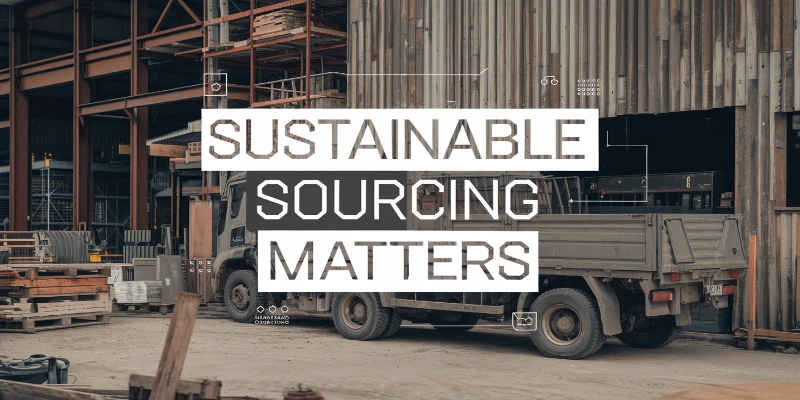
In an era where environmental concerns are at the forefront of business operations, embracing sustainable sourcing practices has become not just a trend but a necessity. Companies are increasingly recognizing that sustainable procurement not only benefits the planet but also enhances their brand reputation, improves efficiency, and drives long-term profitability. This comprehensive guide explores the importance of sustainable sourcing, key practices to implement, and the benefits of adopting a greener procurement strategy.
What is Sustainable Sourcing?
Sustainable sourcing involves integrating social, economic, and environmental factors into the procurement process. It aims to reduce negative impacts on the environment and society while ensuring economic viability. By prioritizing sustainability, businesses can create value for their stakeholders and contribute positively to global challenges, such as climate change and resource depletion.
Why Sustainable Sourcing Matters
Sustainable sourcing is more than just a trend; it’s a crucial strategy for businesses that want to thrive in a challenging business environment. Here are some compelling reasons why sustainable sourcing matters:

1. Environmental Responsibility
Sustainable sourcing minimizes negative impacts on the environment. By choosing eco-friendly materials and processes, companies can reduce waste, lower carbon emissions, and conserve natural resources. This commitment to environmental stewardship not only benefits the planet but also helps mitigate climate change.
2. Regulatory Compliance
As governments worldwide implement stricter environmental regulations, businesses must adapt to comply with these laws. Sustainable sourcing practices help ensure compliance, reducing the risk of legal penalties and enhancing the company’s reputation as a responsible corporate citizen.
3. Consumer Demand
Today's consumers are increasingly conscious of their purchasing decisions. Many prefer brands that demonstrate a commitment to sustainability. By embracing sustainable sourcing, businesses can attract and retain customers who prioritize ethical consumption, leading to increased brand loyalty and sales.
4. Cost Savings
Sustainable practices often lead to long-term cost savings. For example, reducing energy consumption and minimizing waste can lower operational costs. Investing in sustainable solutions may have upfront costs but can result in significant savings over time, enhancing overall profitability.
5. Risk Management
Sustainable sourcing can mitigate risks associated with supply chain disruptions caused by environmental factors, resource scarcity, or social unrest. By diversifying suppliers and implementing sustainable practices, companies can create more resilient supply chains that are better equipped to withstand challenges.
6. Enhanced Brand Reputation
A strong commitment to sustainability can elevate a brand's image. Companies recognized for their responsible sourcing practices often enjoy enhanced reputations, leading to positive media coverage and increased customer trust. This reputation can be a significant competitive advantage.
7. Employee Engagement and Retention
Organizations that prioritize sustainability often see higher employee morale and engagement. Employees feel a sense of pride working for a company that aligns with their values, which can lead to improved retention rates and a more motivated workforce.
8. Access to New Markets
Sustainable sourcing opens doors to new markets and business opportunities. Many consumers and businesses are actively seeking suppliers and partners committed to sustainability. By adopting these practices, companies can tap into this growing demand.
9. Innovation and Continuous Improvement
Embracing sustainable sourcing encourages innovation within the organization. Companies are often compelled to explore new materials, processes, and technologies that can lead to more efficient and eco-friendly practices, driving continuous improvement.
10. Contribution to Global Goals
By implementing sustainable sourcing practices, businesses can contribute to broader global initiatives, such as the United Nations Sustainable Development Goals (SDGs). This not only enhances their corporate social responsibility (CSR) profile but also aligns their operations with global efforts to create a more sustainable future.
Key Practices for Sustainable Sourcing
Implementing sustainable sourcing requires a proactive approach and a commitment to integrating environmental and social considerations into procurement processes. Here are some key practices to consider:
1. Assessing Supplier Sustainability
Start by evaluating your suppliers’ sustainability practices. Consider factors such as their environmental certifications, waste management practices, and labor conditions. Engaging with suppliers who prioritize sustainability ensures that your procurement practices align with your company’s values.
2. Implementing a Supplier Code of Conduct
Establish a supplier code of conduct that outlines your sustainability expectations. This document should cover environmental practices, labor rights, ethical sourcing, and compliance with relevant regulations. Share this code with suppliers and conduct regular assessments to ensure adherence.
3. Prioritizing Eco-Friendly Products
When sourcing products, prioritize those made from recycled, renewable, or sustainably sourced materials. Look for certifications such as Energy Star, Fair Trade, or FSC (Forest Stewardship Council) to identify environmentally friendly products.
4. Reducing Packaging Waste
Collaborate with suppliers to minimize packaging waste. Opt for minimal, recyclable, or biodegradable packaging solutions. Consider bulk purchasing or reusable containers to reduce the environmental impact associated with packaging.
5. Investing in Local Sourcing
Local sourcing not only supports regional economies but also reduces transportation emissions. By prioritizing local suppliers, businesses can decrease their carbon footprint and contribute to community development.
6. Embracing Circular Economy Principles
Adopt circular economy practices by promoting the reuse, refurbishment, and recycling of products. Implement take-back programs or collaborate with suppliers to create closed-loop systems, ensuring materials are continuously repurposed rather than discarded.
7. Leveraging Technology and Data Analytics
Utilize technology and data analytics to monitor and enhance your sustainable sourcing practices. Software solutions can track supplier performance, assess sustainability metrics, and identify areas for improvement in your procurement process.
The Benefits of Sustainable Sourcing
Adopting sustainable sourcing practices offers a multitude of advantages that extend beyond environmental impact. Here are some key benefits that businesses can enjoy when they prioritize sustainability in their procurement processes:

- Enhanced Brand Reputation: A commitment to sustainability can improve brand image and attract environmentally conscious consumers.
- Increased Employee Engagement: Companies that prioritize sustainability often experience higher employee morale and engagement, as workers feel proud to be part of a socially responsible organization.
- Competitive Advantage: By adopting sustainable sourcing practices, businesses can differentiate themselves from competitors, opening up new market opportunities and attracting new customers.
- Long-Term Profitability: Sustainable practices can lead to significant cost savings over time, contributing to long-term financial stability and growth.
- Resilience Against Supply Chain Disruptions: Sustainable sourcing helps build resilient supply chains that are better equipped to withstand environmental changes and market fluctuations.
Also read: How to develop suppliers in Mexico
SIXM: Your Partner in Driving Sustainable Change for Greener Procurement
Embracing sustainable sourcing practices is no longer optional; it is a strategic imperative for businesses aiming to thrive in today’s market. By integrating sustainability into procurement processes, companies can not only reduce their environmental impact but also enhance their reputation, engage consumers, and achieve long-term profitability.
At SIXM, a leading sourcing company, we understand the challenges of implementing sustainable sourcing practices. Our expertise in supplier relations and market analysis can help you develop a greener procurement strategy tailored to your business needs. Together, we can drive meaningful change, ensuring that your sourcing practices align with both your organizational goals and the needs of our planet. Let’s take the first step toward a more sustainable future together!

